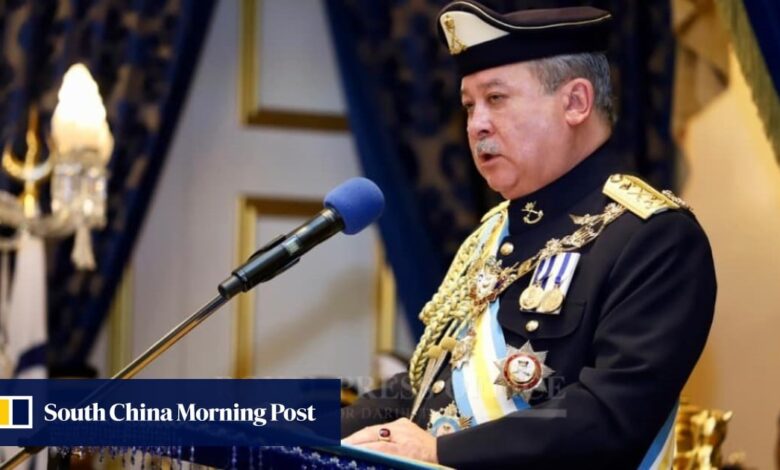Malaysia’s Johor sultan backs plans for economic zone, solar energy sales between state and Singapore

[ad_1]
Sultan Ibrahim Ismail, the head of Johor’s royal household, said the plan, currently being deliberated upon by the national governments of the neighbours, could also see Johor supply solar energy to Singapore.
Singapore seeks other sources of green energy as talks with Indonesia falter
Singapore seeks other sources of green energy as talks with Indonesia falter
Sultan Ibrahim last year conferred Johor’s top state honours on Prime Minister Lee and Ho Ching, in recognition of the “special relationship since time immemorial” between his state and Singapore.
In the Bernama interview, Sultan Ibrahim also signalled his receptiveness for Johor’s “thousands of hectares of unused land” to be used for solar energy production, with Singapore seen as a key market.

In the Bernama interview, Sultan Ibrahim also signalled his readiness to be Malaysia’s next Yang di Pertuan Agong, or king. The position is rotated among the heads of the country’s nine centuries-old royal household, all of whom are Malay-Muslim males.
The nine rulers take turns serving five-year terms as Yang di Pertuan Agong, a ceremonial head of state role that is similar to that of the British monarch. Under the rotational system, Sultan Ibrahim is expected to succeed the current king, Sultan Abdullah Sultan Ahmad Shah, when his term ends on January 30.
“It is not a promotion. It is a responsibility I am prepared to undertake on behalf of my brother rulers,” Sultan Ibrahim said in the interview.
Sultan Ibrahim and his eldest son, Crown Prince Ismail Idris, are Malaysia’s highest-profile royals after Sultan Abdullah, and are not without controversy.

The royal household has vast business interests, and its members have in the past sparred openly with elected officials over policy matters – a practice seen as out of the norm for a constitutional monarch.
Sultan Ibrahim’s holdings include a stake in the US$100 billion Forest City property project developed by the beleaguered Chinese real estate giant Country Gardens.
The monarch in August addressed long-standing criticism about the project and his involvement in it, saying the development did not entail the permanent sale of land to Chinese entities.
The project has been described by some observers as a ghost town, given that it hosts just 10,000 people – about 1 per cent of its target. The Johor special economic zone – first mooted by Prime Minister Anwar – is seen as a means to revive the sprawling project.
[ad_2]
Source link




